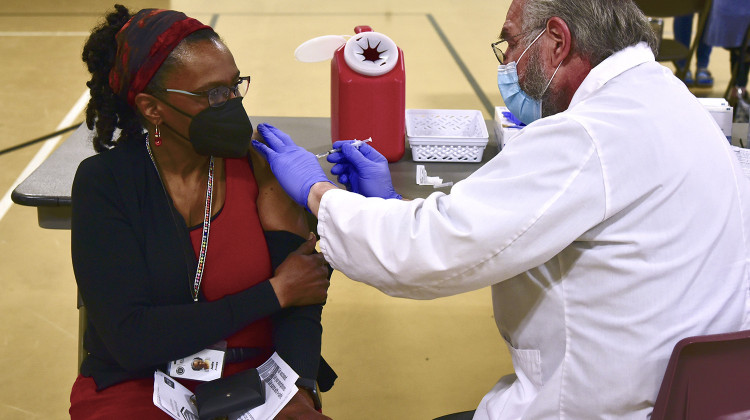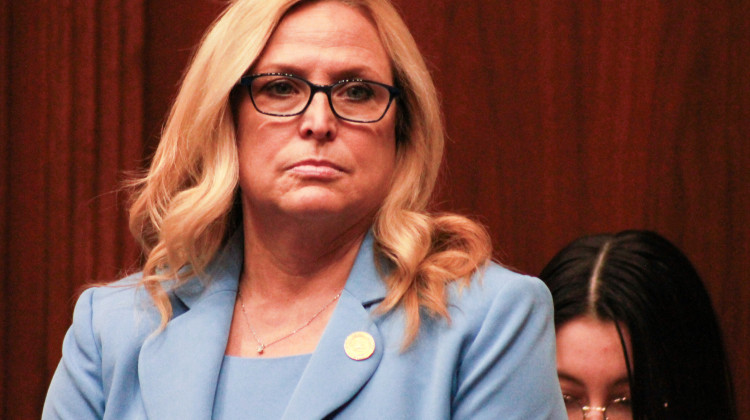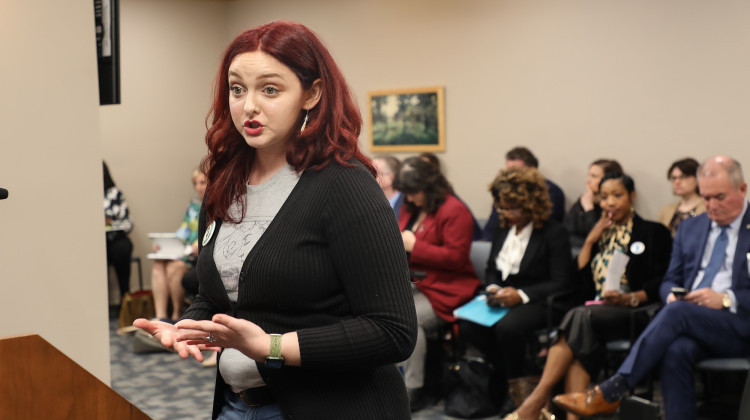
Businesses that remain open must adhere to CDC guidelines on social distancing – providing enough room to maintain six feet of distance between people.
Lauren Chapman/IPB NewsThe Indiana State Department of Health reported 37 additional deaths on Tuesday, bringing the state’s total to 387. The state announced more than 8,500 total confirmed cases, with more than 46,000 Hoosiers tested.
In response to outbreaks at long-term care facilities, State Health Commissioner Kris Box authorized nursing homes and retirement communities to transfer, discharge or relocate residents. In a statement, she said this will allow facilities to establish COVID-dedicated units to protect people who have not tested positive for the virus, and care for those who have.
Indiana Black Caucus Makes Recommendations To Address COVID-19 Racial Disparities
The Indiana Black Legislative Caucus has recommendations for the governor on addressing the disparate impact of COVID-19 on the African American community.
Black Hoosiers account for about 18 percent of COVID-19 cases and more than 20 percent of deaths from the virus. Yet African Americans make up less than 10 percent of the state’s population. And many expect those numbers are actually much worse – the data is largely incomplete.
Indiana Black Caucus Chair Rep. Robin Shackleford (D-Indianapolis) says the reasons for the disparity are systemic.
“Socioeconomic and poverty issues, systematic racism, housing disparities, food and pharmacy deserts,” Shackleford says.
Indiana Dept. Of Correction Announces First Coronavirus-Related Inmate Death
The Indiana Department of Correction reported Tuesday that an inmate has died after testing positive for COVID-19.
According to the agency, the inmate was a male over the age of 70, and was transported to the hospital Monday. He died Monday evening.
A news release from IDOC says the man was an inmate at Westville Correctional Facility in Westville, Indiana. The department says it has no other information available at this time.
COVID-19 Closures Could Make Water Unsafe In Offices, Schools
The COVID-19 pandemic could threaten drinking water safety in buildings that have been closed. Purdue University is working quickly with other research teams across the country to develop guidance for when places like offices, schools, and gyms reopen.
Water left to sit in pipes can get contaminated with toxic heavy metals and bacteria — like the kind that causes Legionnaires’ disease, another illness that affects the lungs.
READ MORE: Can I Go For A Walk? Here's What The Expanded 'Stay-At-Home' Order Really Does
LEE MAS: ¿Puedo Salir A Caminar? Esto Es Lo Que Significa Una Orden De Permanecer En Casa
But Purdue researchers like Caitlin Proctor say right now, the federal government doesn’t have clear, step-by-step guidance on what building owners should do to keep people safe.
“Now that all of the buildings are closed at this wide scale, we might have to start thinking about it because everyone will be exposed in every building all at the same time,” she says.
Federal COVID-19 Relief Money Slowly On Its Way To Businesses, Individuals
U.S. Sen. Todd Young (R-Ind.) says thousands of Indiana small businesses have been approved for disaster loans to help them survive the COVID-19 crisis.
Young says the U.S. Small Business Administration has approved nearly $6 billion in loans for Hoosier businesses, though the money hasn’t been distributed yet.
The senior Indiana senator says the SBA had to rapidly staff up to meet the increased demand for loans, which accounts for slow responsiveness in recent weeks.
“And as they do that, we’ve seen more banks participating, more credit unions, more online banks,” Young says.
All IN: Navigating Loss During A Pandemic
To lose a loved one during the coronavirus pandemic means having to say goodbye under circumstances most of us never would have imagined.
All IN talks to a funeral director about how traditional services have changed, and a chaplain shares the challenges of being unable to comfort patients and families face-to-face. They also hear from a grief counselor, who explains that grief is not exclusively a response to death.
'A Pretty Incredible Woman': The First Hoosier To Die Of Coronavirus, Remembered
Tony Sizemore admits he was a pessimist who didn’t expect much good from other people.
Except for Birdie. He always saw the good in her.
But since Birdie died, he’s begun to see goodness in others. He thinks he understands why.
“It’s just a combination of people being scared, and Birdie being on the forefront of this and being the first one here to die,” he says. “I think it’s a combination of everything that has caused all the love and stuff, and the compassion.”
The forefront of a pandemic.
The first one to die.
On March 16, Roberta Shelton became the first Hoosier to die from COVID-19. She and Sizemore had lived together for the last six years, and to him and everyone who knew her she was Birdie.
Indiana Democrats Move 2020 State Convention Online
Indiana Democrats will hold their 2020 state convention online amid ongoing concerns about the impact of COVID-19.
The move to a virtual and remote convention, set for June 13, was unanimously approved by the party’s state central committee and announced Tuesday.
Democrats choose their nominees for lieutenant governor and attorney general at this year’s convention. They also elect the state’s delegates to the Democratic National Convention. Those votes will take place via mail-in ballot.
Why Carmel Tests Every Employee Who Deals With The Public
Across the country, there have been shortages of COVID-19 tests. However, an Indianapolis suburb has taken an unusual step to keep residents safe. All city of Carmel employees who deal directly with the public are being tested weekly – even if they show no symptoms.
Carmel is a large northside suburb of Indianapolis, home to professional athletes, a massive arts district and top-rated schools. The median household income here is over $100,000 a year – about double the national figure.
Stopping the asymptomatic spread of COVID-19 is the idea behind this city’s testing initiative. Mayor Jim Brainard and health experts looked to Iceland and South Korea for solutions and decided routine testing was the best way to stop the spread.
COVID-19 Funding, Reopening Plans Announced For Evansville
While stressing there’s no timeline yet, Mayor Lloyd Winnecke says they have a plan to reopen the city once they get the guidance to do so.
“Business assistance, testing and workplace comfort, quality of life and government operations are the four main areas that we need to focus on,” he says. “We don’t know when we’ll get the guidance to reopen, but when we do, we want to be as prepared as possible.”
The city also expects about $2.4 million in additional federal funding to bolster its response to the COVID-19 pandemic.
Cities, Counties Cancel And Postpone Summer Events
The Tippecanoe County Health Department issued an order for county residents to cancel or postpone community events through June 30.
In an order dated April 8, Tippecanoe County Health Officer Dr. Jeremy Adler said that gatherings including, but not limited to, “festivals, fairs, carnivals, camps, and sporting events” should be deferred.
In a statement issued Tuesday, the health department said the guidelines applied to those organizing events involving 10 people or more.
The city of Anderson is also canceling summer activities and events to continue distancing efforts to stop the spread of the coronavirus.
Motel 6 Near South Bend To Be Used As Homeless Isolation Facility
The City of South Bend will use the Motel 6 on Indiana 933 in Roseland as an isolation facility for people who can’t safely self-quarantine while waiting for test results or are confirmed with COVID-19 but don’t require hospitalization.
For example, those experiencing homelessness or essential workers who don’t want to risk exposing their family members to the virus.
South Bend Mayor James Mueller says creating an isolation facility has been a top priority.
“This was the only remaining viable option," he says. "If there were to be an outbreak within that community, it would spread very quickly and could increase the number of infected patients in our health care facilities.”
It will be staffed with medical professionals, security, and food delivery. Mueller expects the motel to be ready as an isolation facility by the end of this week. It will serve as an isolation center for at least the next 60 days and possibly up to 90 days.
Contact Lauren at lchapman@wfyi.org or follow her on Twitter at @laurenechapman_.
This is a rapidly evolving story, and we are working hard to bring you the most up-to-date information. However, we recommend checking the websites of the Centers for Disease Control and Prevention or the Indiana State Department of Health for the most recent numbers of COVID-19 cases.
 DONATE
DONATE







 Support WFYI. We can't do it without you.
Support WFYI. We can't do it without you.